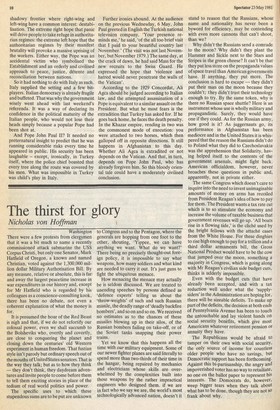The thirst for glory
Nicholas von Hoffman
Washington There were a few protests from clergymen that it was a bit much to name a recently commissioned attack submarine the USS Corpus Christi, but only one Senator, Mark Hatfield of Oregon, a known and named Christian, voted against the 1,300,000 million dollar Military Authorisation Bill. By any measure, relative or absolute, this is far and away the largest peacetime increase in war expenditures in our history and, except for Mr Hatfield who is regarded by his colleagues as a conscience-consulting kook, there has been no debate, not even a coherent explanation of what the money is for.
It is presumed the hour of the Red Beast is nigh and that, if we do not refortify our colossal power, even we shall succumb to the Bolsheviks who, overtly and covertly, are close to conquering the planet and closing down the centuries' old Western experiment in human freedom. That fustian style isn't parody but ordinary speech out of the mouths of UnitedStates senators .That is the way they talk; but as to how they think — they don't think, they daydream adventures and invite people to come before them to tell them exciting stories in place of the tedium of real world politics and power.
The specific uses to which these stupendous sums are to be put are unknown to Congress and to the Pentagon, where the generals are hopping from one foot to the other, shouting, 'Yippee, we can have anything we want. What do we want?' There being no precisely thought-out foreign policy, it is impossible to say what weapons, how many soldiers and what kind are needed to carry it out. It's just guns to fight the ubiquitous menace.
How menacing the menace may actually be is seldom discussed. We are treated to unending speeches by persons defined as 'defence experts' telling us about the 'throw-weights' of such and such Russian missile, the deadly range of 'deadly backfire bombers', and so on and so on. We received no estimates as to the chances of these missiles blowing up in their silos, of the Russian bombers failing on take-off, or of the Soviet tanks snapping their power trains.
Yet we know that this happens all the time with our military equipment. Some of our newer fighter planes are said literally to spend more than two-thirds of their time in the hangar, being repaired by mechanics and electricians whose skills are overwhelmed by the complexities built into these weapons by the rather impractical engineers who designed them. if we are in fact who we say we are, the world's most technologically advanced nation, doesn't it stand to reason that the Russians, whose name and nationality has never been a byword for efficiency, may be contending with even more cannons that can't shoot, than we?
Why didn't the Russians send a comrade to the moon? Why didn't they plant the Hammer and Sickle next to the Stars and Stripes in the green cheese? It can't be that they put less store on the propaganda values of space travel than American governments have. If anything, they put more. The conclusion is hard to escape — they didn't put their man on the moon because they couldn't; .they didn't trust their technology enough to try. By the same token, why is there no Russian space shuttle? Here is an instrument whose use is wholly military and propagandistic. Surely, they would have one if they could. As for the Russian army, how good is it? As juggernauts go, its performance in Afghanistan has been mediocre and in the United States it is whispered that the reason the Russians didn't do to Poland what they did to Czechoslavakia was the apprehension that Solidarity, having helped itself to the contents of the government arsenals, might fight back. American officialdom, however, never broaches these questions in public and, apparently, not in private either.
The same Congress which doesn't care to inquire into the need to invest unimaginable amounts of money on arms has recoiled from President Reagan's idea of how to pay for them. The President wants a tax rate cut which is to so stimulate the economy and increase the volume of taxable business that government revenues will go up. 'All boats rise in a flowing tide,' is the cliché used by the bright fellows with the attaché cases from the White House. For these dinghies to rise high enough to pay for a trillion and a third dollar armaments bill, the Gross National Product would have to be the cow that jumped over the moon, something a majority in Congress, which is going along with Mr Reagan's civilian side budget cuts, thinks is udderly impossible.
Even with the budget cuts that have already been accepted, and with a tax reduction well under what the 'supplysiders' in the Administration are hoping for, there will be sizeable deficits. To make up part of the deficits, the decisiOn at both ends of Pennsylvania Avenue has been to touch the untouchable and lay violent hands on social security benefits, which give most Americans whatever retirement pension or annuity they have.
The Republicans would be afraid to tamper on their own with social security, the only source of income for countless older people who have no savings, but Democratic support has been forthcoming. Against this bi-partisanship, the angry and impoverished voter has no way to retailiate, no one on the ballot paper to represent his interests. The Democrats do, however, weep bigger tears when they talk about what has to be done, though they are not so frank about why.










































 Previous page
Previous page